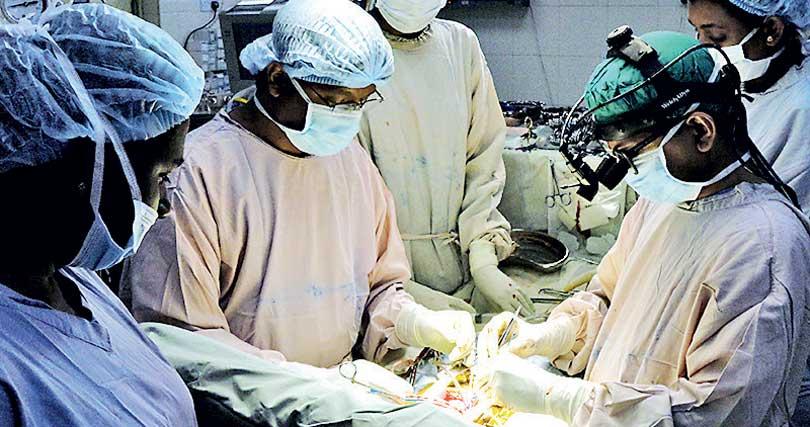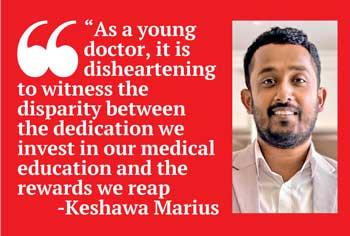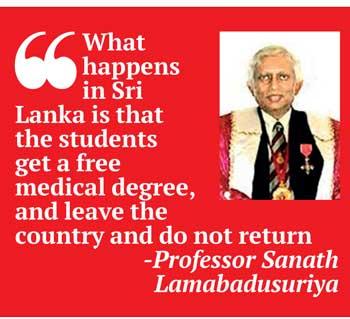24 Aug 2023 - {{hitsCtrl.values.hits}}

Therefore some solutions in summary are:
1. Improved Working Conditions: Enhance the working conditions, salaries, and benefits for healthcare professionals.
2. Invest in Education and Training: Increase investment in medical education and training facilities to produce more healthcare professionals locally.
3. Creation of state hybrid hospitals to increase revenue in the government health sector
4. Incentive Programmes: Develop financial and non-financial incentive programmes to reward healthcare professionals who choose to work in underserved or remote areas. This could include scholarships, concessionary loans, housing support, and career advancement opportunities.
5. Return Migration Programmes: Develop programmes that encourage healthcare professionals who have migrated to return to their home countries after a certain period, bringing back their skills and experience. Therefore, issuing rewards to those who return, and payment of bonds to those who wish to stay back in the foreign country.
6. Research and Innovation: Though there are many brilliant medical minds in Sri Lanka, they simply do not have the time and facilities to research to their potential. Promoting research and innovation within the healthcare sector will definitely foster growth and thus retain local medical talent.
7. Political Stability and Governance: This factor is fundamental to make the country more appealing for its professionals to stay.
Therefore, the primary solutions for medical brain drain are two-fold, we either tax the doctors with bonds where Sri Lanka gains money if they choose to leave, both from the doctor and the foreign government. The second solution would be to invest more in the health sector.
 Brain drain has never been a topic that is uncommon to the public eye of Sri Lanka. It has always been a recurrent theme observed in the output of our state university students. However, it has currently become alarmingly visible in the Healthcare Sector of the country. Let us take a deep dive in this phenomenon, and discern the economic repercussions and solutions to medical brain drain.
Brain drain has never been a topic that is uncommon to the public eye of Sri Lanka. It has always been a recurrent theme observed in the output of our state university students. However, it has currently become alarmingly visible in the Healthcare Sector of the country. Let us take a deep dive in this phenomenon, and discern the economic repercussions and solutions to medical brain drain.
What is Brain Drain?
 The more colloquial definition of human capital flight is brain drain. Human capital is when a country or organization invests in training its workers in order to create higher returns on investment of that labour.
The more colloquial definition of human capital flight is brain drain. Human capital is when a country or organization invests in training its workers in order to create higher returns on investment of that labour.
A simple example would be when a company would train a Sinhala-speaking customer care officer to speak in English as well. Through investing in the education of the officer, the company would not have to invest in a separate English-speaking customer care officer.
However, if the officer decides to migrate due to his newly formed skill, it is called human capital flight. Therefore, though the company has trained the officer to speak in English for the company’s benefit, there will be no return on investment for the company as the officer decides to migrate.
Hence, human capital flight (brain drain) is the migration of trained and educated labour to other countries. Likewise, medical brain drain is the emigration of doctors and other health staff.
Richard Record (the World Bank’s Lead Country Economist for the Western Balkans) and Abdu Mohiddin (Public Health Physician-Scientist/Assistant Professor at Aga Khan University) give a positive outlook on the medical brain drain when considering the country Malawi, “The medical “brain drain” has been described as rich countries “looting” doctors and nurses from developing countries undermining their health systems and public health. However this”brain-drain” might also be seen as a success in the training and “export” of health professionals and the benefits this provides.”
However, Sri Lanka generally does not reap benefits of medical brain drain as medical staff and the foreign country which gains the medical staff are not taxed. Further, foreign remittances from doctors are rather scarce as they usually uproot their families when migrating.
Why is medical brain drain alarming?
 According to the IMF, “Human capital has long been considered an important determinant of economic growth. Therefore, “human capital flight” or “brain drain” can lead to a permanent reduction in income and growth of the country of emigration relative to the country of immigration.”
According to the IMF, “Human capital has long been considered an important determinant of economic growth. Therefore, “human capital flight” or “brain drain” can lead to a permanent reduction in income and growth of the country of emigration relative to the country of immigration.”
This would mean that medical brain drain will not only adversely impact the health sector of the country but will also dampen the economic growth of the country.
The health sector of the country is already finding it hard as it is with shortages of essential medicines, equipment and basic facilities. This shortage is mainly due to the economic crisis, and corruption. However, it is the doctors who receive backlash due to the shortage of medicine. In addition to medicine shortages, we are also now facing a shortage of the most crucial component of the health sector, which is the doctor.
According to Professor Sanath Lamabadusuriya, an Emeritus Professor of Paediatrics, former Dean of the Faculty of Medicine, University of Colombo and one of the foremost paediatricians in Sri Lanka, stated, “What happens in Sri Lanka is that the students get a free medical degree, and leave the country and do not return. Therefore, the intelligentsia is lost to the country.”
The funny thing is Sri Lanka spends its tax money educating our doctors for free, and the majority of them leave for better prospects abroad. However, to leave the doctors must do the qualifying bar exams abroad, which cost around one million rupees.
Therefore, it can be discerned that foreign countries that get our doctors are quite lucky. Not only does the foreign country get a highly trained doctor for free, but that doctor has to pay to become a doctor in that particular foreign country.
Further, the repercussions of medical brain drain have scarred our health sector. Dr. Ashoka Gunaratne from the Specialist Doctors’ Association has highlighted that Sri Lanka currently has only 50% of the necessary consultant doctors (2,000 consultant doctors) in its workforce. Therefore, ideally, there needs to be 4,000 consultants in Sri Lanka. Additionally, retirements within this cadre have further reduced the number to 1,750 specialist doctors. Dr. Gunaratne also pointed out that the country’s sole paediatric radiologist has emigrated due to inadequate facilities.
Why are doctors leaving?
Doctors have some valid reasons to leave the country, with inadequate medical facilities and public backlash stemming from these deficiencies being among the prominent factors.
But on the converse, medical salaries have not increased with the hyperinflation in the country creating challenges for doctors to make ends meet.
For instance, a medical house officer entering the profession at the age of 27-29 and often working extended 24-hour shifts, receives a take-home salary of only around Rs 56,000. This financial strain makes the prospect of seeking better opportunities abroad appealing for young medical professionals, ultimately contributing significantly to the brain drain affecting a vital sector within the nation.
According to Keshawa Marius a young medical doctor awaiting internship states, “As a young doctor, it is disheartening to witness the disparity between the dedication we invest in our medical education and the rewards we reap. With the economy struggling and taxes to pay, we find it tough to live a decent life. Things like owning a home or a car feel far away when we look at our paychecks.
The big difference in pay between Sri Lanka and first-world countries is a major force pulling professionals away. It’s not just doctors – lots of educated young people are looking for better opportunities abroad.
Moreover, the government’s policies and strategies have disappointed us in every possible way. Also, the agenda our national media follow to make a false impression about the health sector and doctors is disheartening.
When things don’t seem to be getting better in the country, frustration grows, and people want to find better chances somewhere else.
Personally, I believe this is just the tip of the iceberg. Even now, a significant number of young doctors are preparing for their overseas medical council examinations like USMLE, PLAB, AMC etc. for overseas jobs. A lot of doctors, nurses, and other professionals are about to leave in the next few years. While I feel sad for my country, I believe our policymakers should research why people are making these choices. Everyone deserves chances to grow in their personal and work lives. We need an environment that helps talented people, values hard work, and gives ways to move forward. Only then can we start to stop people from leaving. Young doctors are the future of the Sri Lankan health system. This is too bad. Hope the right eyes will open before the damage is irreversible.”
Solutions
The reduction of medical brain drain can be conducted by either creating deterrents or incentives to retain doctors in the system.
To deter brain drain Sri Lanka can issue a tax or a bond for state medical graduates if they choose to leave. Therefore, some solutions would be for migrating staff to pay back training costs, or rich host governments remitting part of a tax (e.g. income or national insurance) to the Sri Lankan government. These schemes would allow Sri Lanka to scale up training of health professionals for local needs and to work abroad.
An incentive solution would be to invest more money into the healthcare system. This would amount to higher salaries and better medical equipment.
This could be done by having hybrid healthcare facilities similar to the Jayewardenepura General Hospital where hospital fees are partially paid by the government and the patient. The hospital gains as there is a source of income and the patient gains as they have substantially lesser fees than to a private hospital. This would act as an incentive scheme for doctors to stay back. It is important to note hybrid privatization exists alongside with free government healthcare. Choosing hybrid hospitals are simply a choice of the patient, between either free healthcare or fully private health care.
Opting for hybrid hospitals is entirely the patient’s decision. In addition to hybrid healthcare, the patient still has the option in selecting free healthcare or entirely private hospitals.
Another solution that would increase money in the healthcare system by having private medical colleges (PMCs), which will attract medical students from all over the world to study and thereby investing in our healthcare system. This would also allow students within the country to have a chance to study medicine if they miss the state medical intake. Or else the students who marginally miss the medical cut-off spend millions of Rupees studying medicine abroad, and since most often than not they cannot earn that investment in Sri Lanka, they become absorbed into the healthcare system of the country they studied in. This is another form of medical brain drain. Therefore, PMCs would be a solution to retain prospective medical students who want to study abroad, and it will become a key investment injection into our medical system.
Professor Sanath Lamabadusuriya stated, “In China, there is a medical University where every batch has a minimum of 100 Sri Lankan students. Another famous location for Sri Lankan students is Malaysia, where they are taught by Sri Lankan academics. Sri Lankans pay enormous fees however, it is the University that pockets the money.
The Sri Lankan medical degree has a very good brand name internationally, because our doctors employable and employed worldwide. The moment we have private medical schools we will have applicants from many country. After all Sri Lanka is a country like no other, they would be happy to come here and spend five years and leave with a medical degree.”
(The writer is an economics Lecturer at the Faculty of Management and Finance, University of Colombo)
09 Jan 2025 2 hours ago
09 Jan 2025 4 hours ago
09 Jan 2025 6 hours ago
09 Jan 2025 7 hours ago
09 Jan 2025 8 hours ago